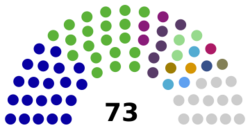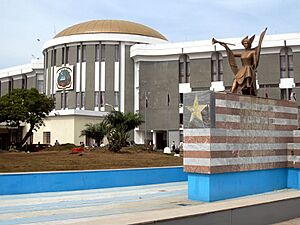Legislature of Liberia facts for kids
Quick facts for kids Legislature of Liberia |
|
|---|---|
| 54th Liberian Legislature | |
 |
|
| Type | |
| Type | |
| Houses | Senate House of Representatives |
| Leadership | |
|
Jeremiah Koung
Since 22 January 2024 |
|
|
President Pro Tempore
|
Nyonblee Karnga-Lawrence
Since 15 January 2024 |
|
Speaker of the House
|
Richard N. Koon
Since 21 November 2024 |
| Structure | |
| Seats | 103 30 Senators 73 Representatives |
 |
|
|
House of Representatives political groups
|
Unity (25)
CDC (10) Liberty (7) NUDP (6) NDC (5) APD (3) NPP (3) MPC (2) LDP (1) LTP (1) NRP (1) Independents (9) |
 |
|
|
Senate political groups
|
Unity (10)
NPP (6) CDC (3) NUDP (2) APD (2) Liberty (1) NDC (1) LDP (1) NDPL (1) Independents (3) |
| Elections | |
|
House of Representatives last election
|
10 October 2023 |
|
Senate last election
|
10 October 2023 |
|
House of Representatives next election
|
2029 |
| Meeting place | |
| Capitol Building, Monrovia | |
| Website | |
| legislature.gov.lr (archived) | |
The Legislature of Liberia is the part of the government that makes laws for the country of Liberia. It is a bicameral legislature, which means it has two parts, or "houses." These two houses are the Senate and the House of Representatives. This system is modeled after the United States Congress.
The members of the Legislature meet at the Capitol Building in Monrovia, the capital city of Liberia. The Legislature is one of the three main branches of Liberia's government. The Constitution of Liberia says that all three branches should be equal and work together using a system of checks and balances. This system makes sure no single branch becomes too powerful.
Contents
What is the Legislature of Liberia?
The Legislature's main job is to create and pass laws for the country. It is made up of two groups of elected officials: the House of Representatives and the Senate.
The House of Representatives
The House of Representatives has 73 members, called Representatives. Each of Liberia's 15 counties gets a certain number of seats in the House based on how many people live there. This is called apportionment.
Representatives are elected by the people in their district for a six-year term. They can be re-elected to serve more terms.
The Senate
The Senate has 30 members, called Senators. Each of the 15 counties elects two senators, no matter how big or small the county is. This means every county has an equal voice in the Senate.
Senators are elected for a longer term of nine years. Just like Representatives, they can also be re-elected. The Vice President of Liberia is the official head of the Senate.
How are members elected?
Both Senators and Representatives are chosen through a direct election. This means that citizens vote directly for the person they want to represent them. The candidate who gets the most votes in their area wins the election.
If a seat in the House or Senate becomes empty before the term is over (for example, if a member resigns), a special election, called a by-election, is held within 90 days to fill the spot.
Who can vote?
To vote in an election for the Legislature, a person must:
- Be a citizen of Liberia.
- Be at least 18 years old.
- Be registered to vote.
- Live in Liberia at the time of the election.
Who can become a member?
To become a member of the Legislature, a person must meet certain requirements.
- To be a Representative, a person must be a Liberian citizen and at least 25 years old.
- To be a Senator, a person must be a Liberian citizen and at least 30 years old.
Political parties also have rules for the candidates they support. For example, they must include a certain number of female candidates to encourage more women to participate in government.
What are the powers of the Legislature?
The Legislature has the important power to make laws for the entire country. According to the Constitution of Liberia, it is one of the three equal branches of government. This creates a system of checks and balances, where each branch can limit the power of the others. This helps keep the government fair and balanced.
The Legislature also plays a role in how the country is organized. It helps define the counties and provinces of Liberia. This allows local areas to have some control over their own growth and development. Local governments can even collect some taxes to pay for services in their area, with support from the national government.
Historical Events
Over the years, the Legislature has used its powers in important ways. Sometimes, it has even held presidents accountable for their actions.
For a long time, especially before 1944, many experts believe Liberia's legislature was very democratic. However, during the time of President William Tubman, some people felt the Legislature lost some of its power because the president had too much influence.
In December 2024, a fire broke out in the Legislature's building during a time of disagreement among its members.
See also
- Politics of Liberia
 | Audre Lorde |
 | John Berry Meachum |
 | Ferdinand Lee Barnett |


